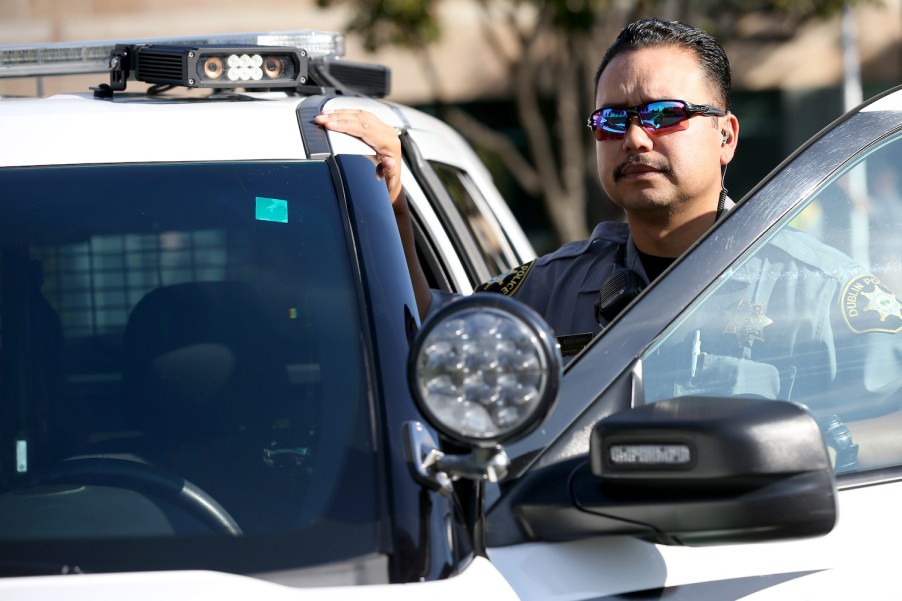
Are The License Plate Scanners on Police Cars Actually Legal?
Automatic license plate reader (ALPR) systems are an increasingly common crimefighting device, though some call these scanners a “mass surveillance technology.” For this reason, a few states have restricted how long police and other organizations can store data on your cars driving habits. But there are no regulations on how and when anyone can collect this data. Therefore, the American Civil Liberties Union is calling for much stricter Federal regulation of ALPR. You are reading Part Four of my ALPR series, which includes articles on how the license plate readers work, how they stop crime, and who has your travel data.
What states allow automatic license plate reading technology?
Every single state allows license plate scanners on police cars. Only nine states have any regulations on how long police or private individuals can keep data on your drives.

Arkansas, California, Colorado, Florida, Georgia, Maine, Maryland, Minnesota, Montana, Nebraska, New Hampshire, North Carolina, Oklahoma, Tennessee, Utah, and Vermont are pioneering regulations on the use of ALPR technology—according to the National Conference of State Legislatures. But ALPR is still in use in all of these states.
New Hampshire is an interesting case. The Granite State, whose license plates read Live Free or Die, banned ALPR technology when it first emerged. But over the years, the successful deployment of ALPR to apprehend criminals in other states made New Hampshire regulators think twice. In 2016, New Hampshire reversed its outright ban.
Minnesota too has an unique law. The Minnesota State Patrol does use ALPR so police officers can monitor passing traffic for vehicles of interest. But they do not keep the data on your past drives for future investigations: they delete it within 48 hours.
Is there any limit to how much driving data the government can collect?
While nine out of 50 states regulate how long a police department can keep information on your driving or parking habits, none of them regulate how this license plate information is collected. What’s more, private databases, subject to no oversight, include information from billions of scans.

With no regulation on how ALPR data is collected, some organizations have invented very creative ways to scan plates. Scanners on city garbage trucks are becoming increasingly popular, so municipalities can monitor who is parked on public streets—daily. In addition, some ALPR manufacturers advertise undercover systems camouflaged as Thule-style rooftop containers.
One of the largest databases belongs to ALPR equipment manufacturer Vigilant (owned by Motorola). This company advertises information from over nine billion scans. It is seeking to expand this database exponentially by partnering with the owners of the ParkMobile app.
Vigilant has offered its vast data to government investigators to solve many crimes. It also sells this data to private individuals, such as repo agents seeking to learn the driving habits or home addresses of a specific target.
Is it illegal to record everyone’s driving history?
Technically, anyone can legally record you taking a drive on a publicly owned road. But the ACLU argues that a central tenant of our legal system is that the government does not record unnecessary information on law-abiding citizens.

The government is not breaking any law by recording every car that passes along a given road. If you wanted to spend the day on a street corner, scribbling down the license plate of every car passing by, it would be well within your rights. Public roads are, after all, public spaces.
But some civil rights advocates are concerned with the eventual repercussions of this data being kept forever. If a future administration wanted to pull data on who attended a certain protest or political rally, or who went to a certain church, visited a specific friend, or saw a given doctor, they could.
The ACLU recommends five new policies going forward:
- “License plate readers may be used by law enforcement agencies only.”
- “The government must not store data about innocent people.”
- “People should be able to find out if plate data of vehicles registered to them are contained in a law enforcement agency’s database.”
- “Law enforcement agencies should not share license plate reader data.”
- “Any entity that uses license plate readers should be required to report its usage.”
What is the future of ALPR use and the regulation of this data? We’ll have to wait and see. But in the meantime, it’s a safe bet that someone has some data on the most recent drive you took.
Next, learn how police stop crime with ALPR or see the Washington Post’s deep dive into ALPR privacy concerns in the video below:



